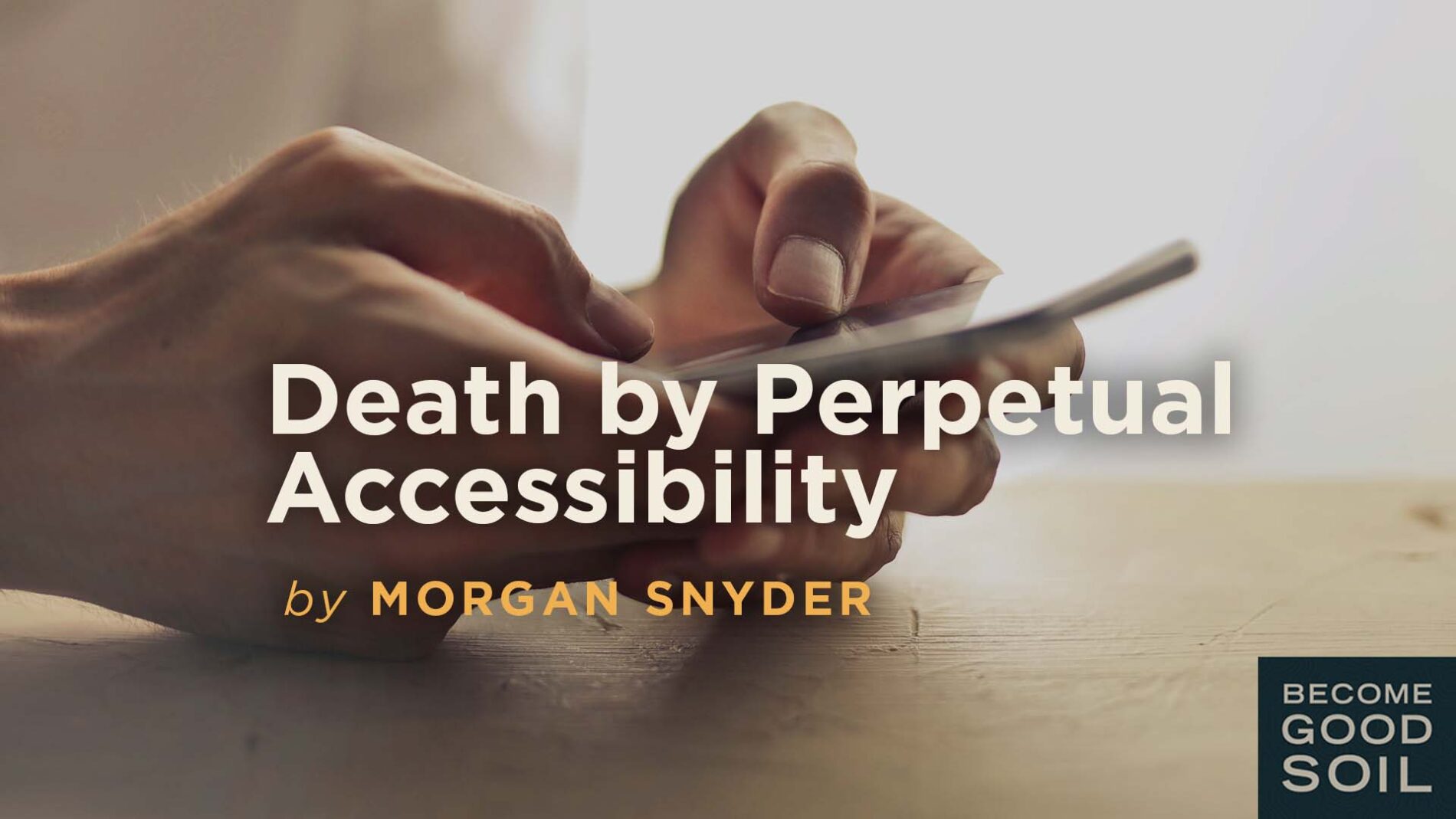Death by Perpetual Accessibility

We live in an era of unprecedented accessibility. And I would like to suggest that it’s killing us.
But first, a few cell phone faux pas:
I’ve butt dialed Darryl Evans.
While trying to play downloaded games on my smart phone, my three-year-old daughter has directly called both a megachurch pastor and the president of a Fortune 500 company on their cell phones.
And finally, I called a friend last week and it went straight to voice mail; not 15 seconds later, I received a text back from him: “…in exercise class. Need anything?”
Reading his text, I felt a surge of emotion. First, anger: not at him, but at “something” I couldn’t quite put into words. Beneath my anger was profound sadness and a good bit of desperation.
Something felt wrong about the compulsion my buddy felt when he pulled away from his class in order to respond to me. His class afforded the rare opportunity to unplug from his world and be refreshed. Some sad combination of technology, timing, and human decision catapulted him out of a moment of refreshment that I am guessing he desperately needed. And I was angry. Really angry.
I recently found a quote from Eugene Peterson that helped me understand my reaction. Peterson fleshes out the orthodox meaning of the “world” and its effect on our life with God:
“An old tradition sorts the difficulties we face in the life of faith into the categories of world, flesh, and devil….The world is protean: each generation has the world to deal with in new form. World is an atmosphere, a mood. It is nearly as hard for a sinner to recognize the world’s temptations as it is for a fish to discover impurities of water. There is a sense, a feeling that things aren’t right, that the environment is not whole; but just what it is eludes analysis. We know that the spiritual atmosphere in which we live erodes our faith, dissipates hope, and corrupts love, but it is hard to put a finger on what is wrong.”
I think I am on to one thing that is wrong: the unprecedented accessibility that marks our generation. We can pretty much be reached anytime, anywhere, by anyone; and as I said in the beginning, I think it’s killing us.
By killing us, I mean it’s threatening our solitude and communion with the Father and opening us to all kinds of opportunities to walk without him. This is happening in two particular ways that are very relevant for this decade of the thirties.
Perpetual accessibility is causing us to sin against others and others to sin against us. Keep in mind Paul’s thought that “whatever is not from faith is sin” (Romans 14:23).
The bar is so low, and communication is so easy, that our accessibility to interact and interject into the lives of others has exceeded our maturity to do it well.
With little thought, pause, or spiritual discernment, we can react, respond, and communicate. Too often it is not the Spirit of God who moves us into these interactions, but rather a whole army of other motives.
Secondly, circumstances used to aid our lack of accessibility and therefore guard our solitude. In ages past, it simply took much more energy to communicate. I recall stories of life on our great grandparents’ farms: Sunday was a “visiting” day. Friends from neighboring farms would come by, and life would be shared. Sunday was the visiting day because the other days simply were not available, not accessible. Phones were rare; horses took a heck of a lot of time and work to get us from point A to point B. The bar was higher. Circumstances inhibited our accessibility to others. People communicated because it was important, not because it was easy. Our age is a different one. In this age of perpetual accessibility, circumstances are often our enemy. We must fight against the current in order to protect the richer, contemplative life deep within.
In today’s world we must discern, with fierce intentionality, our accessibility.
When are YOU inaccessible, really? When can no one get to you, really? (Pause and honestly answer this question.)
The essence of solitude is to disconnect from the world, your world, so that you can connect with God. What does solitude look like for you in this decade?
A mentor told me he’s adopted a “no electronics” policy for his car and his Sundays. No phones. No distraction, no noise, no accessibility. Now, don’t quickly jump to “oh, it’s probably a priest or some spiritual guy.” Nope, he’s president of a large company. He answers to many guys that crap bigger than me. His courage unnerves me. I’ve tried his “policy” and am failing miserably. My truck has become a satellite office; on Sundays, I just ratchet it down, kind of, a little bit. Unless of course, there is a crisis. (Have you noticed how many crises of other people become your crises through perpetual accessibility?) Jesus, forgive me. Come into this place!
It’s got to stop. Here. Today.
We must guard our moments and hours of solitude as fiercely as we guard the sanctity of our marriages and the integrity of our character.
We have much to encourage us along the way. Proverbs says that wisdom shouts from the street corner (1:20). The holy irony is that we can only hear it if our internal world has been quieted and tuned in.
To be transformed from the inside out, there must be some piece of each day where we are not accessible and therefore have the space to allow our hearts to open and receive our Father. We need the daily and weekly bread of solitude to cultivate the quietness of our internal world and the sensitivity of our heart to his voice.
Where are these moments of solitude in your life? Where can you resist the pressure of perpetual accessibility in order to nourish your communion with God? What is your piece of inaccessibility for each day?
It’s hard to begin to find that time; pulling away for even 10 minutes may feel “irresponsible.” But it’s worth it. Come, Father, come for all of us…

